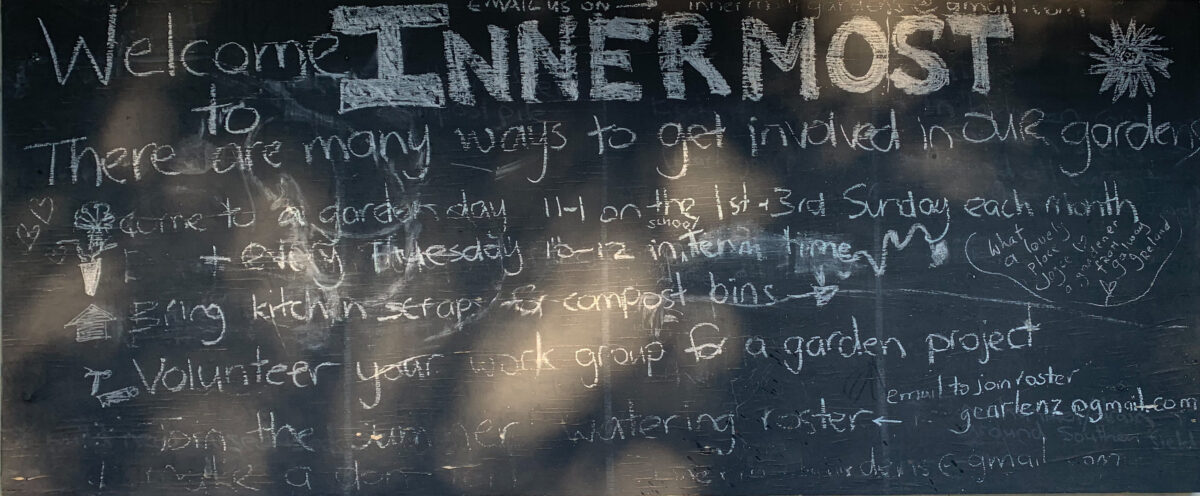Innermost Gardens have been growing community through ‘hands in the soil’ since 2006. Our permaculture based, 100% volunteer led, garden provides a multitude of ways for folks to connect and enjoy regenerative gardening right in the heart of Wellington City.
As a medium on which to test and exercise the newly developed impact framework Innermost Gardens have been collecting data on various measures since January 2019. The sunburst chart below presents the data for those measures.
This a useful example of the framework applied and provides a powerful foundation for an evidenced based story. With the measures recorded we can easily narrate the story of our community benefit …
Our Story
In the 12 month period (from March 2019 – March 2020) over 6180 people across the Mt Victoria and Inner City communities have benefitted from these gardens in some way. Over 4710 people from a range of groups including home school, meditation, dancing and special needs have benefited from the hall facilities. 480 people have attended community dinners served with food from the garden and over 620 people were actively involved in gardening and personal development.
Our hall can potentially be used for emergency accommodation and has first aid kits on hand. We have a kitchen and recently installed a 4000 litre water tank for backup water supply (primarily for garden watering). In response to an increase in unsanctioned public harvesting (notable increase over COVID) Innermost have collaborating with a local urban farm, KaiCycle, to grow rapid crops at Innermost for community harvesting. This has worked well and added yet another dimension to community engagement for the gardens.
79 Production Trees and or Perennial Shrubs were planted as well as 698 Native Trees and/or Grasses and Plants. Allotment spaces for individual gardeners were increased by 20% up to 24 allotment beds.

At the beginning of the first COVID-19 lockdown, along with the Mt Vic Hub and local gardeners, Innermost produce and volunteer time helped to deliver over 100 cooked meals to our community and to those in need around Wellington (a planned community dinner was packaged into home meals). A staggering number of locals have enjoyed the gardens as a space for daily recreation, to walk through and enjoy during the COVID-19 lockdown period.
The onsite public compost operation had an estimated 850 kitchen green waste drop offs, amounting to 7,477 Kg of input material, from the local Mt Victoria community in the last 12 months. The composting process has the potential to have sequestered over 26,822 Kg of C02-e in GHG (Greenhouse Gas Emissions) that would otherwise be released into the atmosphere if it went to landfill. From that over 267 Kg of potential nitrogen equivalent fertiliser and 133 Kg of potential Phosphorus were generated that will continue to feed the soils.

Over 80% of those folks dropping off compost walked as part of their daily recreation and over 74% lived within 1 km of the gardens. 93% were dropping off compost because they wanted to contribute to climate change mitigation while 63% don’t have their own compost pile.
100% of the value was delivered by 100% volunteers
This is an evidenced based story, supported by collected data and in some cases transformed into information e.g. Kg of C02-e in GHG. The data is a combination of quantitative data e.g. how much kitchen waste processed, and more qualitative data e.g 93% were dropping off kitchen waste because they wanted to contribute in their own way to climate change mitigation. We used various tools to develop these measures. They include…
Carbon Calculator
The compost carbon calculator transforms the raw kitchen waste drop off measurements into potential greenhouse gas emissions mitigation and fertiliser equivalent creation
Impact Framework
The Impact Framework tool is a way of recording measures into key performance indicators categorised by category. Most measures are manually collected on a month by month basis
Google Surveys Data
Q Codes are generated with free software that enables anyone with a smart phone to connect to a google form (again free) to input feedback to questions such as ‘What motivates you to drop off your compost at Innermost?’
Permaculture applied
At Innermost Gardens we leverage Permaculture ethics and principles as our compass and guide. Permaculture practitioners believe in caring for the Earth, caring for our People and in balance and fair share. These ethics are supported by twelve principles that can guide our thinking and our designs. The application of permaculture as our way of working is an important aspect of our own narrative. To find out more about Permaculture applied, see Tim’s diploma thesis here.

